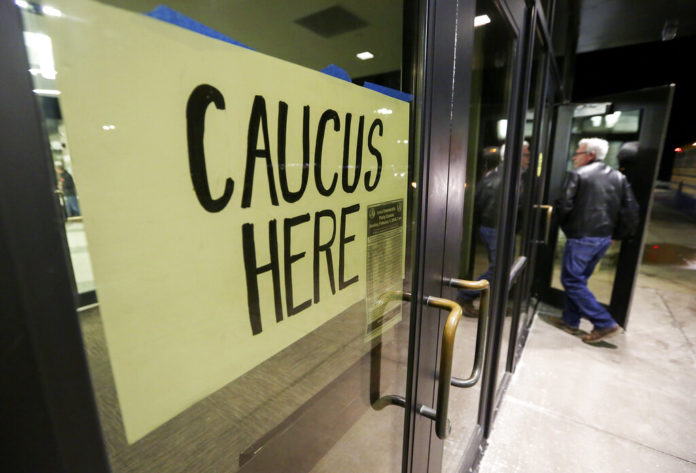
NEW YORK (AP) — As MSNBC’s Katy Tur wandered through a gym in Des Moines during her network’s coverage of the Iowa caucuses Monday, she found a voter wearing a Bernie Sanders button sitting with supporters of Amy Klobuchar.
“I’m a little split,” the woman conceded.
Call her the poster girl for media coverage of Iowa, a carnival of democracy that was fun and bewildering to watch until it all went sour. The failure of authorities to produce results meant no one knew as bedtime came what it would all mean to the matter at hand: picking a Democratic candidate to challenge President Donald Trump in November.
Reporters swarmed to sites where voters, for the first time in the 2020 campaign cycle, were making their voices heard. Yet their findings were only anecdotal.
“It’s most unfair to the voters, the caucusgoers who came out today, when now they have a question mark hanging over the results,” said CNN’s David Chalian.
Candidates gave speeches to their supporters with no real idea of what it all meant, and their campaigns let reporters know of their unhappiness.
Unlike in past election cycles, Iowa seemed to sneak up on television viewers, despite nearly a year’s worth of debates and campaigning. Trump’s impeachment trial, where closing arguments were televised earlier Monday, robbed much of the public attention.
ABC, CBS and NBC evening newcasts devoted a total of 10 minutes to the Iowa campaign last week, compared with 86 minutes the week ahead of the 2016 caucuses and 66 minutes in 2012, according to news consultant Andrew Tyndall.
For Monday’s vote, cable news networks assigned their number crunchers — Steve Kornacki on MSNBC, John King on CNN and Bill Hemmer on Fox News Channel — in front of data screens in studios.
The real action was happening on a granular level, with reporters in rec halls and auditoriums interviewing citizens as they bunched together with like-minded Democrats supporting the candidates of their choice.
In Sioux City, a CNN camera followed the decidedly low-tech system of a precinct commander counting the raised hands of supporters for each candidate, hoping he wasn’t missing or double-counting anyone.
“This is like the nerdiest reality television show ever,” said CNN’s Van Jones.
Tur darted between sections of gymnasium stands, pointing to groups of supporters for Bernie Sanders, Elizabeth Warren, Pete Buttigieg, Joe Biden, Amy Klobuchar and Andrew Yang.
“I feel like I’m directing a wave or a cheering crowd,” she said.
CNN and MSNBC sent reporters to different caucus sites across the state, while Fox News seemed caught between two impulses. An election panel featuring Bret Baier, Martha MacCallum, Karl Rove and Chris Stirewalt was on hand for news and analysis, working in between the commentary of Tucker Carlson, Sean Hannity and Laura Ingraham.
Carlson at one point complained about “the illiterates posing as political analysts on your TV,” presumably on rival networks. Hannity talked about the “radical, extreme, socialist Democrats” and the screen behind him labeled the campaign a “Democratic dumpster fire.”
An unexpectedly raw exchange on MSNBC illustrated the tensions within the Democratic Party.
When Sanders surrogate Nina Turner, in an interview with Chris Matthews, referred to billionaire Michael Bloomberg as an “oligarch,” the word choice angered network analyst Jason Johnson. He said it’s fine to debate Bloomberg on his ideas, but wrong to slur him because he has money. The two went at it, talking over one another.
The fight annoyed host Nicolle Wallace, a former Republican who makes no secret of her distaste for Trump.
“I am nauseous when I see Democrats fight amongst themselves,” she said.
Meanwhile, The New York Times website announced the return of “The Needle.” The clocklike graphic measures, in real time, the chances of different candidates winning in a particular caucus or primary.
That evoked some post-traumatic distress for Democrats, who recall how similar tools on election night 2016 began with Hillary Clinton a seemingly sure winner and slowly swung over into Trump territory.
“Hello darkness my old friend,” was one comment on Twitter.
Republished with the Permission of the Associated Press.












